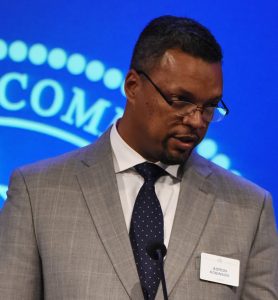True confession: I have something in common with Adron Robinson. I, too, have chaired a failed search committee.

Adron Robinson, search committee chair (Baptist Press)
But my experience was on a local-church level, not on a national denominational level. Nevertheless, I have more empathy for the chair of the presidential search committee for the Southern Baptist Convention Executive Committee than most people. Right now, the talk is about the candidate who was voted down, but the behind-the-scenes talk is about the “process” that went awry.
Most of us will never know what really happened within the Executive Committee’s search committee. We were not there. We did not go through their “process.”
Anytime people don’t like the outcome of a committee’s work, the first line of argument always is against “process.” From my time as a pastor, I swore I never wanted to hear or use that word again.
“Critics who can’t control a process rush to criticize the process.”
Critics who can’t control a process rush to criticize the process.
In this case, however, two things may be simultaneously true: The SBC’s executive search process may, indeed, have been flawed and opportunists may have seized upon “process” to seek a different outcome more favorable to their agendas. Note the plural “agendas” here.
Even the new Executive Committee trustee chairman, David Sons, said as much after the meeting: “Most of the concerns that we heard from the Executive Committee trustees today were not about Jared personally, were not about his qualifications, were not about his leadership. It was more so about the process of how it came to be.”

Jared Wellman
What tanked Jared Wellman’s nomination to become president of the Executive Committee does not appear to be a single thing but a complex intersection of things. Again, as the former chair of a failed pastor search process, I understand that complexity — in hindsight.
I’ve never met Wellman in person; I’ve only watched him lead meetings via Zoom and speak at microphones at SBC annual meetings. I sorta like the guy, which probably would have been another mark against him had that been known beforehand. Someone like him doesn’t need a liberal SBC exile like me endorsing him.
One of the things I noticed in him is the efficiency with which he ran Executive Committee meetings. Do you know how rare it is for lay leaders and even pastors to rise to high levels of denominational service and be fit for such a public role?
“This was not about Wellman’s credentials as a conservative.”
One thing we can say with certainty: This was not about Wellman’s credentials as a conservative. Theologically and socially, he appears to be as conservative as anyone in the SBC would hope for.
And at age 39, Wellman would have been the youngest head of the Executive Committee in our lifetime. That would have been positive on multiple fronts.
Despite all these positives, someone somewhere failed to count the votes.
Never in my decades of experience with the SBC — and perhaps never in the history of the SBC — has a candidate for an entity presidency been voted down by a two-to-one margin. Throw whatever superlative you want on this, and it’s not too much: Unprecedented, historical, stunning, unbelievable. This just doesn’t happen.
Yet it did.
Which leads us to ask why.
Although Executive Committee trustees met in closed session to debate the nomination and vote, it doesn’t require an eavesdropping device to figure out the broad themes at play. As we’ve previously reported, Wellman faced at least three strikes that called him out:
First, he’s a white man who was chosen over a Black man who also was an obvious candidate for the role and would have been the first Black agency head in the history of the denomination formed out of white supremacy.
Now I know some of you are going to react to that sentence above and accuse me of being some sort of liberal advocate for affirmative action. OK, I am, but that’s not why I wrote that sentence.
“McLaurin took over a dumpster fire and turned it into a banquet.”
Nominating Willie McLaurin to keep doing the job he’s doing but without the “interim” title was such an obvious choice that even outsiders could see it. McLaurin took over a dumpster fire and turned it into a banquet. There are not many people who could have endured what he has in the past two years while also injecting positivity and energy into the wonkiest of all SBC jobs.
That’s true whether he’s Black, white, Asian or Latino. He has been publicly auditioning for the permanent role and by any reasonable measure has passed with flying colors. The suspicion is — rightly noted — if a white man had done what he’s done there would have been no debate about who to hire.
For the first time ever, the SBC had a Black person as an entity head and chose not to keep him in the role. He was not just a candidate among the candidates. He was the candidate to beat. And whatever legitimate liabilities the search committee saw in him, they were not obvious to those outside the room.
That puts the onus on the search committee to explain itself.
Second, both Wellman and the search committee did not act prudently in untangling his dual role as a presidential candidate and as chairman of the trustees. At a minimum, Wellman should have resigned from the Executive Committee the moment he became a candidate for the president’s role.
That did not happen. In fact, the worst possible choices were made. He did not resign until he was named the final nominee, and news of his resignation was hidden on purpose. If you want to lob a complaint about process gone wrong, this is where to stake your claim.
Maybe the search committee went to Wellman and recruited him to be considered. We don’t know. But the fact that he was an ex officio member of the search committee at the time he was being interviewed presents a horrible optic. And then keeping all this a secret just smeared dirt all over the optical lens.
Third, he was not the preferred candidate of the Conservative Baptist Network, which has been working — unsuccessfully — for the past four or five years to get control of the denominational mechanism.
These ultra-conservative conservatives say they want to “change the direction” of the SBC — meaning they desire a smaller tent rather than a bigger tent. Many of them also do not believe there is a real sexual abuse crisis in the SBC and think last year’s independent investigation has been vastly overblown. Wellman would not have carried their water on this; quite the opposite.
We’ll never know what the vote would have been if just one of these three factors were at play, although it’s likely Wellman would have been elected with a sufficient majority to take the role.
How he would have fared with a split vote amid an already divided convention is hard to predict.
For now, the Executive Committee already has named a new search committee that will get to work from scratch. We assume — but do not know — McLaurin will continue to serve as interim president.
Here, I have one bit of advice from my own experience: Take your time. There are no quick fixes to train wrecks such as these. In our case, the church appointed a second search committee that went all the way to the beginning and worked the process anew. In time, they recommended a pastor who was not a candidate the first time around and who served a long and beautiful tenure there.
Out of defeat came new vision and growth. May the same be true for the SBC Executive Committee.
Mark Wingfield serves as executive director and publisher of Baptist News Global. He is the author of the new book Honestly: Telling the Truth About the Bible and Ourselves.
Related articles:
SBC Executive Committee rejects nominee for president
Ronnie Floyd resigns SBC Executive Committee leadership with two weeks’ notice


